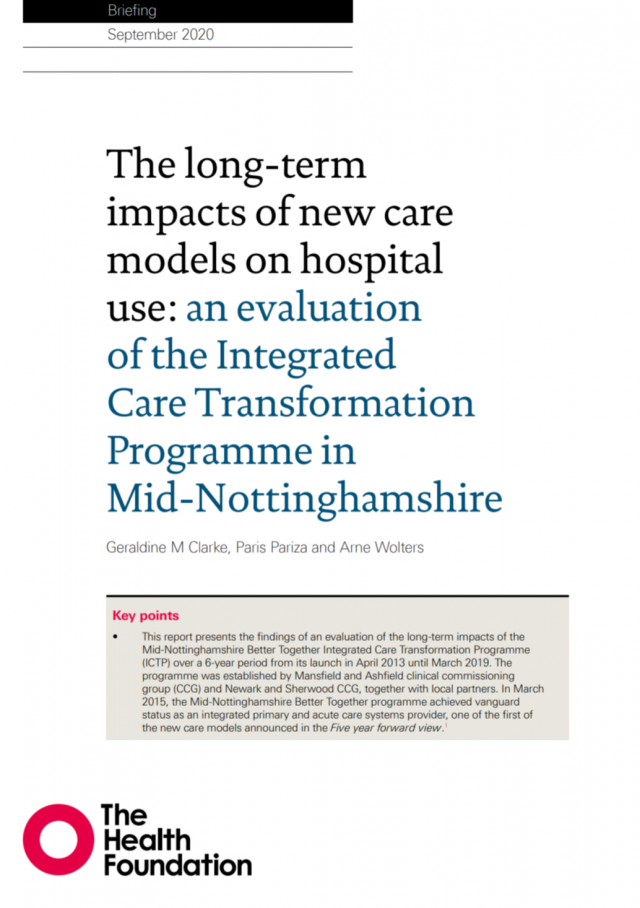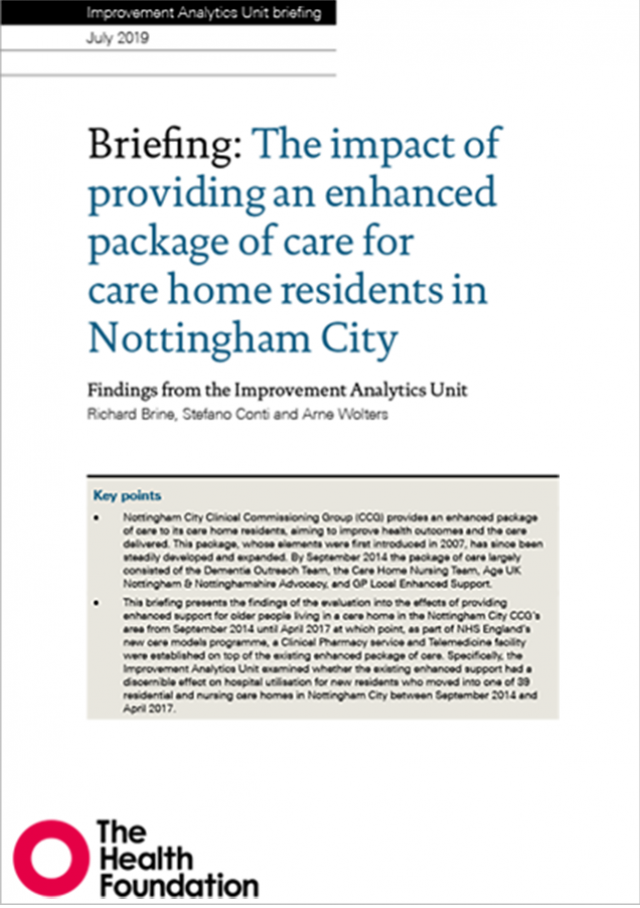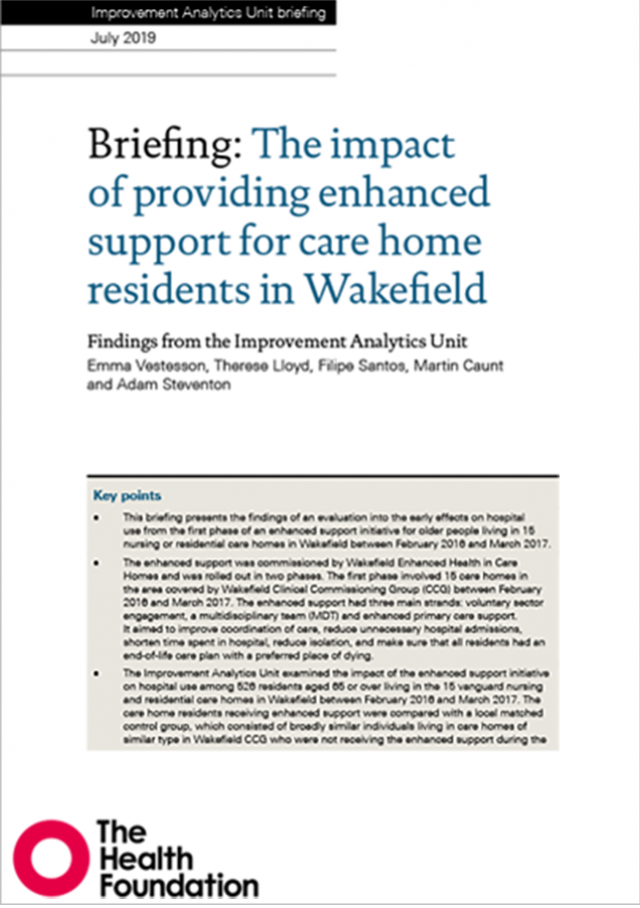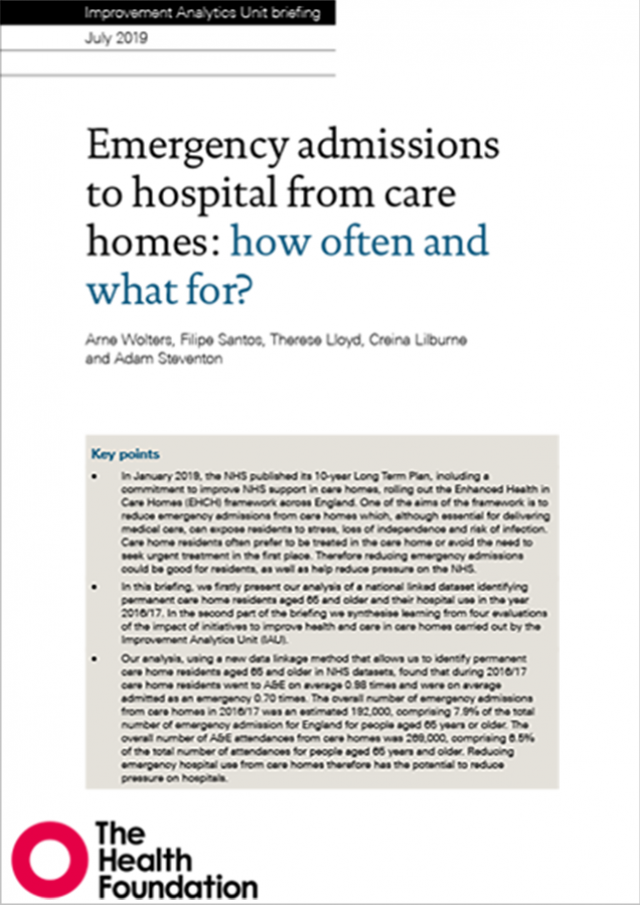The long-term impacts of new care models on hospital use
The briefing examines the impact of Mid-Nottinghamshire's Integrated Care Transformation Programme initiatives on hospital use.


The Improvement Analytics Unit (IAU) is a unique partnership between NHS England and the Health Foundation. We evaluate complex initiatives in health care in order to support learning and improvement.
Our unique access to NHS data combined with our ability to work closely with decision-makers, allows us to deliver independent, rigorous evaluations of complex change to better inform policy and care. We share our ideas, capabilities, and experience. And we collaborate with others to encourage analysis and evaluation.
By providing rapid feedback to service leaders and decision-makers at both a local and national level, we help to identify what is working well and what might need to change in the future to improve outcomes.
Over the last decade, a number of national transformation programmes have been established to improve quality and efficiency in health care, often through the provision of more integrated care. The best analytical approaches to evaluate the impact of complex changes such as these are demanding to apply and the required capability is not always available in the NHS.
The Improvement Analytics Unit aims to fill this gap by:
The IAU’s senior sponsors are Charles Tallack, the Health Foundation’s Director of Data Analytics and Ming Tang, National Director Data and Analytics at NHS England.
We deliver rigorous analysis and evaluation of complex change in major health programmes. We do both rapid evaluation work and carry out long-term studies. What we discover influences decision-makers in the development of national health and care programmes and policies.
The team at the Improvement Analytics Unit are experts in robust evaluation. We use a range of evaluation methods, particularly focusing on counterfactual analysis – one of the most rigorous ways to determine the real impact of interventions.
Robustly evaluating the impact of complex change often requires the use of a counterfactual control group. Counterfactual analysis relies on making a comparison between a group of patients who have experienced an intervention with a carefully matched control group who have not. We take a wide range of factors into account so that we can be sure that any differences observed between the two groups are likely to be the result of the intervention.
Our aim is to support learning and improvement through evaluation.
Combining analysis from the Improvement Analytics Unit with local intelligence helps to guide the development of improvement on the ground. We know such improvement is complex and takes time. However along the way, the analysis can be used by those delivering change to bring valuable insights and to identify whether they need to alter their approach (‘course correct’) to improve outcomes.
Working with NHSE’s national programme teams, we are currently undertaking evaluations of:
For further information, or to register your interest in taking part in an evaluation, please get in contact with Geraldine Clarke, Senior Analytical Manager.
The briefing examines the impact of Mid-Nottinghamshire's Integrated Care Transformation Programme initiatives on hospital use.

A collection of resources developed by the Improvement Analytics Unit to promote understanding of robust quantitative evaluation methods among analysts and those who commission evaluations.

The digital-first primary care goal set out in the NHS Long Term Plan has been thrown into the spotlight during COVID-19. We examine early results from 51 GP practices using askmyGP to explore how pri...
The IAU statistical analysis protocols are intended to guide analytical processes. They include the proposed evaluation design, statistical methods, and the limitations of the analysis.
Arne discusses how the increasing use of technology in health care brings new challenges for evaluators.

Using insight from novel data analysis has the potential to maximise the impact of improvement programmes. Here, Filipe Santos explores new findings on care home residents’ use of emergency services.

Examining whether enhanced support had an effect on hospital utilisation for new residents who moved into care homes in Nottingham City.

Evaluating the early effects on hospital use from the first phase of an enhanced support initiative for older people living in care homes in Wakefield.

Combined learnings from national linked datasets and focused care home evaluations in Rushcliffe, Sutton, Wakefield and Nottingham City.

Can health service evaluations be both rapid and rigorous? Arne Wolters reflects on his experience with the Improvement Analytics Unit.

We look for talented and passionate individuals as everyone at the Health Foundation has an important role to play.
View current vacanciesQ is an initiative connecting people with improvement expertise across the UK.
Find out more